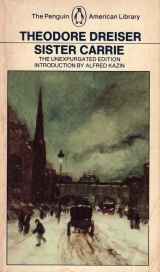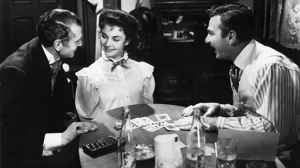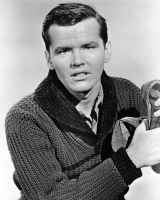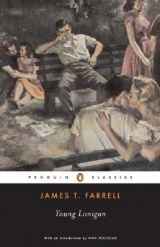Fame: Carrie the Victim, Studs the Triumphant

Horace Greeley once said that fame is a “vapor, popularity an accident, and riches take wings. Only one thing endures and that is character.” His notion is dead on, for fame is like a gas that easily dissipates; popularity is merely a good run of luck or chance; riches are neither certain nor grounded. At the end of the day, character is what matters most. There are those, however, that would not take Greeley’s idea to heart.

If Studs Lonigan or Carrie Meeber were to see this quote, they would merely scoff at it, shrug it off, and call it on its fallacies. In each respective novel, these two characters experience a rise in ‘fame’ and, in a sense, become celebrities to those in their immediate societies. It is this theme of fame that is considered significant in both Dreiser’s Sister Carrie and Farrell’s Young Lonigan. While both Carrie and Studs each rise to fame in their own ways, the ways that their celebrity statuses affect them in the long run are rather different.
Carrie Meeber
In Theodore Dreiser’s novel Sister Carrie, the title character is introduced to readers as a young girl from the country that comes to the great and ever-growing city of Chicago in hopes of creating a successful future. She wants nothing more than to be known and have what others have. However, within the first few chapters, it is made evident that Carrie has never truly had to try and get a job, nor has she ever had to support herself. Readers get a sense of Carrie’s lack of self-confidence in the beginning of the novel, too. While she is looking for a job, she suddenly becomes hyper-aware of herself, and she begins to compare herself to those around her.
She cares so deeply about how others perceive her, and she makes this clear to readers; while she is walking the streets of the city in search of a job, she comments on the clothes of higher class women, pointing out that they “[are] neat, [and] in many instances fine” and that these women only seemed notice “[Carrie’s] own position—her individual shortcomings of dress and that shadow of manner which she thought must hang about her and make clear to all who and what she was” (Dreiser 23). Her desire for material possessions begins to grow from that point on.

Her lack of confidence is also seen each time she makes an inquiry about job openings. The rejection that she encounters only magnifies her low self-esteem, making her less and less confident in her appearance, as well as her abilities. Throughout the novel, however, her interactions with both Drouet and Hurstwood seem to boost her confidence, and after Drouet recommends that she try out for a part in a local play, she seems to cultivate a new dream—the dream to rise to fame as a stage actress.
Fame’s Adverse End-Game for Carrie
In the end, she works hard to get her foot in the door of the acting industry. She becomes enthralled in the theatre life and eventually rises to fame and fortune. In the face of her fresh fame, she is “delighted” and she finally begins to “feel that she [has] a place in the world” because “people recognized [her] ability” (406). For quite some time, she was “doing better” and her “clothes improved” (407). After a while, though, she begins to feel unhappy with her success and the material possessions that she has acquired over time.
In a conversation with Ames towards the end of the novel, he states that the “huzzas of the public don’t mean anything” (483). This statement causes her “[think] of her own short struggle” and makes her “[feel] as if her whole life has been one of turmoil, for which her present state [is] no reward” (483). She goes on to say that “[she doesn’t] seem to be doing what [she wants] to do” (483). While she once felt happy and satisfied, she begins to feel desolate and discontented. She becomes “weary of stage people” and feels “very much alone, very much as if she were struggling hopelessly and unaided” (486-487). Overall, her fame ultimately leads her to sorrow and emptiness.
Studs Lonigan

Studs Lonigan, the main character in James Farrell’s Young Lonigan is another who rises to fame. The beginning of the novel finds Studs facing an obvious identity crisis. For a long time, he was the boy that followed all of the rules and never broke the reigns. However, being on the verge of fifteen years old, he begins to feel the need to shed that image, to build the reputation of a tough guy. He hides away in the bathroom, smoking Sweet Caporal cigarettes and sneering at himself in the mirror (Farrell 5). Essentially, he tries to get the tough guy look down, even though he still puts on the façade of an innocent schoolboy.
Rather than having a low level of self-confidence like Carrie, Studs just does not know which side with which to identify himself; is he truly tough at heart, or is he the soft guy that he has been brought up to be? As the novel progresses, readers see Studs’ obvious shift towards becoming a tough kid. His choice to embrace the rough lifestyle common of other Irish boys living in the Chicago Southside is solidified after he beats Weary Reilley in a street fight.
Studs’ Positive Experiences with Fame
After his success in this adolescent street bout, Studs immediately rises to fame among the other teens in the area. His friends instantly “[shower] Studs with praise” and tell him “how great he [is] and how he [is] the champ of the neighborhood” (Farrell 88). Studs thrives in the limelight; he welcomes the “sycophantic comments” being thrown his way, noting on how these comments“[purr] sweetly on his ears” (88). Even after giving out, as well as taking, a beating, Studs feels that “all [is] swell” and that “[makes] him feel good” (89). Unlike Carrie, Studs’ feelings about his fame do not dwindle, but rather boost his ego and his image as tough Irish boy.

When Young Horn, another Southside youngster, sees Studs on Indiana Avenue, he points out that Studs is “the champ fighter of the block”; Studs’ ego fluffs greatly, and instead of reacting in modesty, he “[laughs] to himself, proud” (90). Later on, when O’Brien asks who the “hardest guy in the gang” is and Johnny replies “Studs”, Studs blushes joyfully, noting internally that he is “secretly pleased” (97).
Even in more intimate moments, such as when he goes swimming in the lake with Kenny, Studs notices that he “[likes] himself a lot” and that instead of being ashamed of his figure like he used to be, he now “[likes] his body” (144). In the end, his fame results in contentment, a boost in his image, and an increase in his ego. Instead of this feeling slowly fading, it maintains through to the end of the novel.
Fame and celebrity status certainly affect different people in different ways. This fact is definitely evident in both Sister Carrie and Young Lonigan. Carrie and Studs each reach celebrity status in their own ways in each respective novel. Nevertheless, the ways that their celebrity statuses affect them in the long run differ. From these two characters and their relationships with fame, readers are able to see how it can turn into something positive or something negative. Not only that, but readers also learn a valuable lesson—that fame affects everyone differently and that it is important to be mindful of all the possibilities, positive and negative, that come attached to fame.
Works Cited
Dreiser, Theodore. Sister Carrie. New York: Penguin, 1900.
Farrell, James T. Young Lonigan. New York: Penguin Group, 1932.
What do you think? Leave a comment.











Sister Carrie is a major commentary on American society. Our society is based around the idea that if we could just have more money, fame, a different lover, or a bigger place to live, we would be happier.
I usually don’t like classic books, but Sister Carrie really grew on me.
Young Lonigan did not interest me at all. I found it extremely difficult to read through. It felt as if the writer was just sitting down and writing random snatches of tough boy life without any forward thinking
The general things that appeal to me in Carrie was how I liked the realism of the story, no sugarcoating or focusing on the romance too much, I like how the time flows in the novel, especially in the second half of the novel, how the author depicts the mundaneness of the characters’ life, how he accentuates the extreme importance of the money… I’m also fond of the author’s idea that we’re constantly pursuing happiness, but often it keeps evading us.
Two very thought-provoking novels and an eye-opening for many. Lovely piece.
Lonigan made me really happy I am not 14 years old….
But what fascinates me about Sister Carrie was how much “Americanness” we can impute to it. Carrie, Wisconsin girl come to the big city, what does she want? how does she feel? Nothing – she just kind of floats around and takes it in stride, whether or not she’s listlessly hunting for a job or listlessly being seduced by her suitors.
Sister Carrie could have been a very interesting book. The plot line was exciting enough. It was supposed to be scandalous and dramatic which if written by anyone else it might have been. But Dreiser was not only extremely boring but he had to put his two cents in all the time with his comments on society before every chapter. This commentary basically told the reader exactly what was going to happen. It was also very wordy. He felt the need to ramble on and on about little details that had no significance later on in the book. Carrie wasn’t even a likeable protagonist. She manipulated people to get material things like new clothes and when she got what she wanted she threw people away, even causing one lover to not only divorce his wife but then commit suicide. She even tried to make herself seem like the victim all the time. By the end of the book I didn’t even care that she became a famous actress. I would have rather seen something bad happen to her because that is what she deserved. There really is no true protagonist in the book. For example, Charlie Drouet was a coniving, pig who only wanted Carrie for one thing and gave her things so he could get it. And Hurstwood was willing to throw away his entire family for Carrie because she was beautiful and naive. There really was no one to root for or care about. I’ve never had to force myself to read a book like I did when I read Sister Carrie.
The Lonigan Trilogy was way too dark for my taste.
I found Carrie to be a character larger than the novel, and not even Dreiser could contain her personality.
To me, Carrie novel shows the failings of men and the societal restrictions placed on women. Every woman in the novel is better than the man she is married to (or living with) and would be a much more capable leader and provider.
I really like your writing style, and the way you integrated quotes is great! Interesting read, although (I’m ashamed to admit) I haven’t read these novels; but I’d like to now after reading your piece.